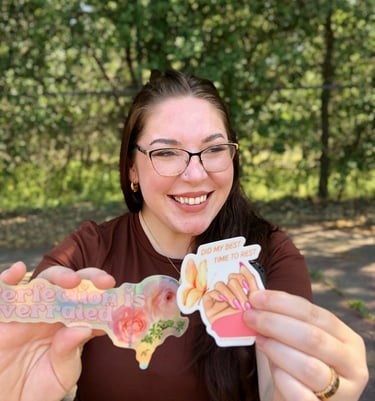💛 Earn rewards when you refer a friend - learn more here

Why Cleaning Is Emotional Work (and What That Means for You)
11/18/20254 min read


Cleaning looks simple from the outside.
A wipe here, a sweep there, a load of laundry, a tidy reset.
But if you’ve ever found yourself staring at a mess you want to tackle and still can’t move…
If you’ve ever felt strangely emotional while trying to fold clothes or sort a pile…
If you’ve ever wondered why something so “basic” feels so heavy—
You’re not alone, and you’re not doing anything wrong.
For so many of us, cleaning isn’t just physical work. It’s emotional work. And most of us were never taught to see it that way.
The Emotional Layers Hidden in Everyday Tasks
When you walk toward a sink full of dishes or a room that’s been quietly stressing you out, you’re not just walking toward items. You’re walking toward feelings.
So many women carry:
Shame:
That whisper of “I should have kept up better.”
The pressure of doing everything right while doing everything else.
The fear of being judged if someone stopped by unexpectedly.
Overwhelm:
Your brain sees 100 decisions at once:
Where does this go?
Do I need this?
What if I get started and run out of steam?
Task-switching is exhausting — especially for a busy, neurodivergent, emotionally stretched woman.
Guilt:
For resting instead of tackling the mess.
For letting things pile up during hard seasons.
For not being able to do it alone.
Grief:
Grief that nobody taught you how to create a safe, functional home.
Grief for old versions of yourself who were just trying to survive.
Grief for the life you thought you’d be living by now.
Identity & Expectations
Many of us inherited beliefs about what a “good woman,” “good mom,” or “good partner” should do.
Cleaning becomes tangled in roles, identity, and old scripts that never fit us in the first place.
So when you clean, you’re not just dealing with stuff. You’re untangling memory, pressure, shame, and self-worth. Of course it feels heavy.
When Cleaning Becomes a Mirror
Your home quietly mirrors the state of your nervous system.
When life feels chaotic, your home often shows it.
When you’re healing, your home shifts with you.
When you’re burned out, the corners you avoid are usually the corners that hold emotional weight.
That bag you never unpack? It’s tied to a season you barely made it through.
The laundry you fold but never put away? It reflects decision-fatigue, not carelessness.
The room you keep avoiding? There’s a story in there. A feeling. A memory. A pressure.
You’re not avoiding the task. You’re protecting yourself from the feeling connected to it. That’s not laziness. That’s your nervous system doing its job.
The Nervous System Connection (Why Your Brain Resists Cleaning)
Here’s the part no one talks about:
Your brain doesn’t resist cleaning —
your brain resists overwhelm.
Cleaning activates your survival system more than people realize.
Fight - Rage cleaning out of frustration or panic.
Flight - Suddenly reorganizing your schedule instead of starting.
Freeze - Staring at the mess, unable to take the first step.
Fawn - Cleaning only when others might judge.
ADHD, anxiety, depression, trauma, motherhood, chronic stress — they all shape capacity. They all influence how “simple” tasks feel.
When your nervous system isn’t regulated, consistency becomes nearly impossible. Not because you’re inconsistent — but because you’re overloaded.
How This Shows Up in Real Life
Every woman who carries emotional or nervous-system weight recognizes these moments:
The chair that collects everything
The kitchen reset that starts strong and suddenly stops
The bathroom you pretend not to see
The pile you move from surface to surface
The drawer that’s too overwhelming to sort
The half-finished area that whispers “you don’t follow through”
But here’s the truth: These patterns tell a story about what you’ve lived through — not who you are.
What This Actually Means About You
It means you’re human.
It means you’ve carried too much alone for too long.
It means you were never taught to see your home as something that should feel safe, not perfect.
It means you’ve survived more than people realize.
And it means the way forward isn’t pressure…it’s gentleness.
A New, Kinder Way to Begin Cleaning
Cleaning becomes easier when the emotional load is acknowledged first.
When you treat yourself like someone worthy of patience. When you stop trying to conquer your home and instead try to meet yourself.
Here’s the Tidy On Your Terms approach:
1. Start with safety, not pressure
Before touching a task, help your nervous system settle.
Light a candle
Turn on music
Take one slow breath
Sip something warm
Your body needs to feel safe before it can feel motivated.
2. Start tiny on purpose
Choose the smallest, lightest task available.
One surface
One pile
One decision
Two minutes
Small tasks don’t build shame — they build trust.
3. Return instead of restart
You don’t need to start fresh every time.
You just need to come back.
Returning builds self-trust. Self-trust builds momentum. Momentum builds peace.
4. Honor the emotions in the room
If something feels heavy, pause.
Ask yourself what you’re carrying — not what you’re failing at.
Every emotion you meet with compassion becomes easier to move through.
5. Build systems rooted in safety
Not strict routines. Not rigid rules. Not unrealistic expectations.
Gentle systems. Flexible structure. Room for real life. Room for rest.
Your home doesn’t need a stricter version of you — it needs a supported one.
What This Means for Your Long-Term Peace
When cleaning becomes emotional work, something shifts.
You stop blaming yourself. You stop hiding. You stop waiting for the “perfect” moment.
You start giving yourself permission to show up imperfectly.
And it’s imperfect momentum — not perfection — that creates lasting peace. Your home heals as you do.
One gentle return at a time.
One softened expectation at a time.
One act of self-love, self-forgiveness, and self-trust at a time.
Final Thoughts
If cleaning feels heavy, there’s a reason.
If home care feels emotional, there’s a reason.
If you feel behind, there’s a reason.
And none of those reasons are weakness. You’re not meant to go through this alone. You are meant to be met with softness.
With safety. With grace. With support.
Your home doesn’t need perfection — it needs you, exactly as you are, learning to love and trust yourself again.

🌿 About the Author
Hi, I’m Jocelyn—the heart behind Tidy On Your Terms. I help people create home systems rooted in self-love, not shame. My work blends cleaning and organizing with nervous system support, forgiveness, and flexibility—because your space should feel like peace, not pressure.
📖 Bring Encouragement Into Your Home
Looking to bring some encouragement into your space?
Check out the paperback Tidy On Your Terms here—a soft, supportive introduction to our approach.




